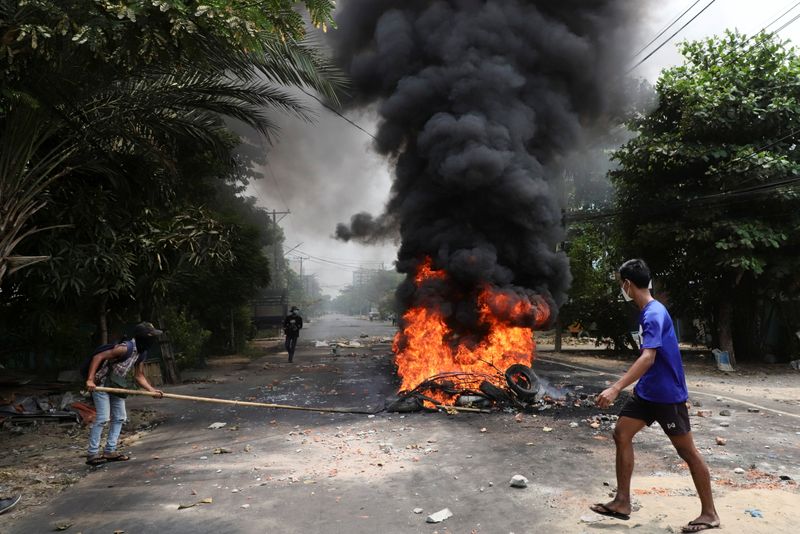(Reuters) - Myanmar's deposed leader Aung San Suu Kyi appeared in good health in a video meeting on Wednesday, one of her lawyers said, as the United States ordered its non-essential embassy staff to leave after weeks of violence over a Feb. 1 coup.
The detained Nobel laureate, who has been held in custody since the military seized power, had wanted to meet lawyers in person and did not agree to a wide discussion by video in the presence of police, lawyer Min Min Soe told Reuters by telephone.
"Amay looks healthy, her complexion is good," Min Min Soe said, using an affectionate term meaning “mother” to refer to Suu Kyi.
Only the legal cases against her filed since the coup were discussed during the video conference, the lawyer said.
Suu Kyi, 75, was arrested the same day the military seized power and faces charges that include illegally importing six handheld radios and breaching coronavirus protocols.
The military has also accused her of bribery in two recent news conferences.
Her lawyers say the charges were trumped up and dismissed the accusation of bribery as a joke.
The next hearing in her case is on Thursday.
The military seized power saying that November elections won by Suu Kyi's party were fraudulent. The election commission said the vote was fair.
The reimposition of military rule after a decade of tentative steps towards democracy has triggered unrelenting opposition.
At least 521 civilians have been killed in protests, 141 of them on Saturday, the bloodiest day of the unrest, according to the Assistance Association for Political Prisoners (AAPP).
Fighting has also flared between the army and ethnic minority insurgents in frontier regions. Refugees fleeing the turmoil are seeking safety in neighbouring countries.
Thousands of protesters were out again on Wednesday in different parts of the country.
Residents in the main city of Yangon banged pots and pans and honked their car horns in a clamour of defiance as a news crew from CNN was shown around in what its correspondent said was a heavily armed convoy.
The Mizzima news portal reported a gun battle between security forces and civilians near the northwestern town of Kale. There was no word on casualties and Reuters could not verify the report.
Police and a spokesman for the Myanmar junta did not answer calls seeking comment.
There is growing international concern about prospects for the country with no sign of a path out of the crisis. The junta has not taken up offers from its Southeast Asian neighbours to help find a solution.
The United States on Tuesday ordered the departure of non-emergency U.S. government employees and their family members due to concerns over civil unrest.
'HORRIFYING VIOLENCE'
City-based opponents of military rule have called for a united front with insurgent groups that have battled the government for decades for greater autonomy in the border regions.
The military has defended its long grip on power by saying it is the only institution capable of holding the country together.
Myanmar's oldest rebel group, the Karen National Union (KNU), said on Tuesday it was bracing for a major government offensive on its areas of operation along the eastern border with Thailand.
The KNU urged the international community, and Thailand in particular, to help Karen people fleeing the "onslaught" and called for countries to cut ties with the junta to stop the violence against civilians.
Military aircraft bombed KNU fighters at the weekend, sending about 3,000 villagers into Thailand.
Thailand denied accusations from activists that refugees were being forced to return but a Thai border official said the army was sending most people back because it was deemed safe on the Myanmar side.
A spokesman for the U.N. refugee agency said it was concerned about reports people were being sent back and it was seeking information from Thailand.
Fighting has also increased in the north between government forces and the Kachin Independence Army (KIA), most recently with a KIA attack on a police station early on Wednesday, the Kachin News Group said.
People have also been crossing Myanmar's northwestern border to seek refuge in India, where a border state withdrew an order to refuse refugees food and shelter after a public outcry over the measure.
Western countries have condemned the coup and the violence and called for Suu Kyi's release. Some have imposed limited sanctions.
But those pressing for change have limited leverage in a country that was largely isolated for decades under strict military rule, and which retains the support of countries like Russia and China.
In Washington, U.S. Secretary of State Antony Blinken said foreign countries and companies with significant investments in enterprises that support Myanmar's military should reconsider those stakes.

The violence was "reprehensible" and followed a pattern of "increasingly disturbing and even horrifying violence" against the demonstrators, he said.